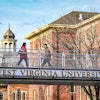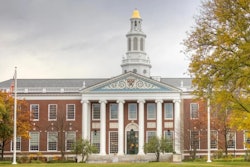WASHINGTON, D.C. – A work abroad experience can potentially be an invaluable asset for STEM students in the global economy, but institutional leaders must spend time and resources to structure the experience in a way that achieves measurable results.
That was one of the key insights offered Thursday at the start of a two-day workshop titled “Creating Globally Minded STEM Professionals Through Internships/Work Abroad Programs.”
The workshop—hosted by the Institute of International Education—drew dozens of higher education professionals seeking ways to develop programs that provide students with an international perspective on professions they can access through their chosen field of study.
Attendees got an entrée of examples during a panel discussion on existing successful models.
At the University of Rhode Island, officials have developed a global engineering program that sends 25 percent of the university’s engineering students abroad—several times the 3.9 percent of U.S. engineering students nationally that go abroad.
The five-year program provides students foreign language instruction in order to prepare them to work abroad for one year. The program offers two degrees: one in engineering and one in a foreign language.
“We’ve found that the best and brightest students are interested in this model,” said Dr. Sigrid Berka, executive director of the International Engineering Program at URI and director of the German and Chinese IEP at the school.
The model encountered some resistance from foreign language instructors, who resented being seen as a practical service to engineering students as opposed to being able to delve into art and literature in their respective language, Berka said.
But while German and French language programs are being axed nationally, Berka said, those languages are in high demand at URI because the International Engineering Program sends many of its engineers to work in Germany and France.
The program also has brought in grants, including Title VI grants, FIPSE grants, and NSF grants, which are ultimately what won it favor among administrators.
“It was working so well in bringing in money,” Berka said. “That’s when the administration started to jump on the bandwagon.”
Developing and sustaining the program, however, is no cakewalk.
“You need to be an entrepreneur in the field,” Berka said. “Don’t be shy of working extra hard and traveling.
“You also need to be tactful and have a lot of patience.”
Dr. Eckhard Groll, director of the Office of Professional Practice and a mechanical engineering professor at Purdue University, said institutions must offer an array of programs—from those that have a high impact on a low number of students to those that have a low impact on a high number of students.
“You cannot go with one program and have one program fits all,” Groll said. “So there’s a spectrum.”
Groll spoke briefly about a Purdue program called GEARE (Global Engineering Alliance for Research and Education).
Among other things, the program provides students with 12 credit hours in a foreign language, a domestic internship followed by one semester of study abroad and an international internship, and participation in a global design team project for at least semester.
The program has proved to be an excellent recruiting tool to bring women into engineering, Groll said.
Jim Galvin, Director of Opportunities Abroad & Faculty Led Programs at the University of California San Diego, said institutions should employ metrics to ensure that their work abroad programs are having an impact.
“We want to begin to quantify the intercultural competence of our students,” Galvin said, explaining that his university uses an instrument known as the Intercultural Development Inventory, or the IDI, to assess the degree to which students have grown in global competence as a result of their experience abroad.
Jon Gordon, Director of Assessment at the Georgia Institute of Technology, suggested universities also should measure labor market outcomes for graduates who have had work abroad experiences.
“Long term we want to look at (whether) these experiences lead to better employment outcomes, or more promotions or higher salaries,” Gordon said. “Are their career pathways affected by these kinds of experiences?”
In order to help students get the most out of a work abroad experience, universities must send staff abroad to visit with employers and partner universities, panelists said. They said it also pays to match students with work experiences where they can draw upon the skills they acquired through their field of study.
“The matching process is extremely important,” said Berka, of URI. “Whoever arranges these internships has to have some knowledge of the companies. Take tours.”
Berka said universities should demand that the students “do some homework” as well before they apply to a particular company so that they can defend why they think they are a good match.
“You have to guide the students,” Berka said. But, at the same time, she said, “you have to honor students who go out of their way instead of just being guided.”



















